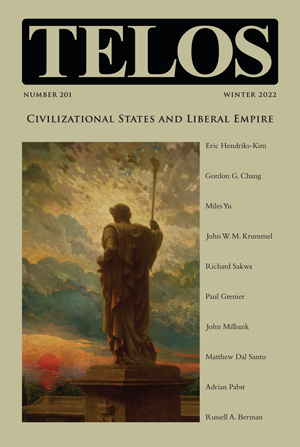In today’s episode of the Telos Press Podcast, David Pan talks with John Milbank about his article “A Tale of Two Monsters and Four Elements: Variations of Carl Schmitt and the Current Global Crisis,” from Telos 201 (Winter 2022). An excerpt of the article appears here. In their conversation they discuss the three idioms into which Milbank divides Carl Schmitt’s thought; why they should be seen as separate idioms rather than different aspects of a single perspective; the extent of overlap between the idioms; whether the decisionist Schmitt is as arbitrary as he is made out to be; the characteristics of a medieval European conception of nomos that Schmitt wishes to retrieve; the similarities between Schmitt’s third idiom of global regions and both Nazism and Russian theorists like Gumilev, Panarin, and Dugin; Schmitt’s decisionism, basic values, identity, and thinking through popular sovereignty. If your university has an online subscription to Telos, you can read the full article at the Telos Online website. For non-subscribers, learn how your university can begin a subscription to Telos at our library recommendation page. Print copies of Telos 201 are available for purchase in our online store.
A Tale of Two Monsters and Four Elements: Variations of Carl Schmitt and the Current Global Crisis
John Milbank
Introduction
This essay is divided into two distinct parts.
 In the first I shall explore the complex way in which Carl Schmitt’s thought was split three ways: between a Catholic universalism that extends the “law of humanity” to the whole of the globe; a modern defense of the normativity of the absolutely sovereign nation-state; and finally a stress upon the primacy of a more limited civilizational landmass, smaller than that of the whole planet but larger than that of the state. In this third case, it is actually “empire” that is covertly to the fore and supremely the Western land-based empire that had once been Christendom.
In the first I shall explore the complex way in which Carl Schmitt’s thought was split three ways: between a Catholic universalism that extends the “law of humanity” to the whole of the globe; a modern defense of the normativity of the absolutely sovereign nation-state; and finally a stress upon the primacy of a more limited civilizational landmass, smaller than that of the whole planet but larger than that of the state. In this third case, it is actually “empire” that is covertly to the fore and supremely the Western land-based empire that had once been Christendom.
For the first idiom, the “enemy” is simply evil and the “exception” is our equitable and grace-given resistance to evil. For the second, the enemy is the alien to the nation and the exception is the arbitrary confirmation of formal sovereignty required for the sake of peace, appealing to no substantive normativity. For the third, the enemy is more civilizational and prototypically it is the Muslim in contrast to the Christian. While the third idiom bears traces of the Catholic generosity of the first, it is in the end marred by atavism and thereby more linked to Schmitt’s time of Nazi allegiance than is the second idiom.
I shall contend below that the first idiom is continually suppressed by Schmitt. The second idiom was at first dominant and never entirely abandoned. But increasingly, it was the third idiom that was to the fore: the celebration of the civilizational landmass. Thus, it is defense of the latter that proves marginally more primary in Schmitt’s excoriation of Anglo-Saxon “sea empire” rather than the defense of the landed nation-state, as one might assume.
Already, in the first part of the essay I will imply that the second idiom corresponds roughly to the Westphalian order of independent nation-states and its Kantian internationalist, economistic modification (which Schmitt scorned) that today we think of as “globalization.” The attempt to reassert a more Hobbesian and nationalist basis for this order (at times supported by Schmitt) corresponds roughly to what we describe as “populism” today.
The third idiom corresponds roughly and for genealogical reasons (which will be indicated) to the Eurasianist ideology of Vladimir Putin, which combines both nationalist and imperialist elements, both the insistence on absolute sovereignty and a mystique of mingled races and soils. For this ideology the “enemy” is the decadent liberalism of the West and “exception” is justified in the defense of absolute and unmediable civilizational difference.
In the second part of the essay I shall attempt to articulate a development of Schmitt’s neglected first idiom: a universalism of land and spirit. This will nonetheless draw somewhat, albeit in a thoroughly modified manner, upon Schmitt and the Eurasianists’ interests in the elemental and in the relationship of the human spirit to the natural world. It will argue for a more universalizing and commonwealth-oriented “imperialism” as against either atavistic nationalism or atavistic empire and will reject Schmitt’s dualism of “land and sea.”
What I am thereby ultimately hoping to point toward is a reworked “nomos of the earth.”
Continue reading this article at the Telos Online website. If your library does not yet subscribe to Telos, visit our library recommendation page to let them know how.



